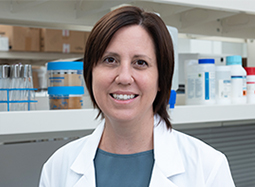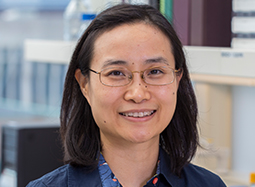Van Andel Research Institute launches metabolism and nutrition research program
New initiative aims to uncover role of metabolism in health, and disease development, onset and progression
September 18, 2018

GRAND RAPIDS, Mich. (September 19, 2018) — Van Andel Research Institute (VARI) has launched the most comprehensive metabolism and nutrition research program of its kind, aimed at developing scientifically driven strategies for promoting health, and preventing and treating diseases such as cancer, Parkinson’s and diabetes.
“Metabolism is the cornerstone of biology and, as such, plays a central role in keeping us healthy,” said Peter A. Jones, Ph.D., D.Sc. (hon), VARI chief scientific officer. “This program will take an expansive view of metabolism, linking dozens of fields and disorders. By uncovering the metabolic drivers of disease, we hope to improve patient treatment options and, one day, even prevent illness.”
Metabolism powers each and every biological process, from regulating appetite to ensuring the heart has enough energy to beat. Some diseases, such as diabetes, are wholly metabolic in origin, while others, like cancer, are now known to be influenced by dysfunctions in metabolism. Even Parkinson’s disease, a neurological movement disorder that steals away the ability to move, now appears to be caused, at least in part, by disruptions in cellular metabolism.
The new initiative bridges metabolism, nutrition, epigenetics and immunology, and incorporates dozens of other fields, such as molecular biology, genetics, biochemistry, structural biology, imaging, diagnostic development and modeling. Its long-term goals include the design of clinically translatable tools for predicting metabolic and nutritional disease risk (for example, a metabolic fingerprint to predict cancer risk).
The program will be led by Russell Jones, Ph.D., an expert in the study of how cancer cells take advantage of metabolism to proliferate and evade detection by the body’s immune system. Previously, he was an associate professor at McGill University in Montreal, Quebec, and director of the Metabolomics Core Facility at McGill’s Goodman Cancer Research Centre. He will be joined by:
- Connie Krawczyk, Ph.D. who investigates the links between metabolism, epigenetics and the immune system, with the goal of understanding how these systems work together to keep us healthy and, when things go wrong, to promote disease. She also joined VARI from McGill University, and is an associate professor.
- Adelheid Lempradl, Ph.D., who investigates how the dietary choices of parents may impact the health of their offspring in the hopes of translating her findings into new ways to prevent disease and create a healthier future. She joined VARI from Max Planck Institute of Immunobiology and Epigenetics in Freiburg, Germany, as an assistant professor.
- Andrew Pospisilik, Ph.D., who seeks to understand how we become who we become, and how our disease susceptibility is defined from early on in life, even before conception, with the long-term goal of being able to predict lifelong health outlook at birth. He also comes to VARI from Max Planck Institute of Immunobiology and Epigenetics.
In addition to his role as a professor in the program, Pospisilik will assume the directorship of the Institute’s Center for Epigenetics, one of VARI’s three research centers, this winter. Part of his vision includes the development of a pioneering center for inter-generational medicine.
They will join Institute investigators Brian Haab, Ph.D., a pancreatic cancer and metabolism expert whose work centers on developing new and urgently needed diagnostic methods, and Ning Wu, Ph.D., whose research is shedding new light on how the complicated relationship between metabolism, aging and chemical signaling can give rise to and propel cancer.
Together, their efforts will integrate with the rest of the Institute’s research portfolio, opening up new avenues for collaboration both inside and beyond VARI. In the long-term, program investigators hope to align research goals with the needs of physicians on the frontline of patient care.
“Van Andel Research Institute’s commitment, flexibility and science-focused infrastructure will ensure that we successfully build a unique, innovative and impactful metabolism program that achieves its goals to positively impact human health,” said Russell Jones. “This is the right time and the right place to make a significant impact on how we view health and treat disease.”
###
ABOUT VAN ANDEL RESEARCH INSTITUTE
Van Andel Institute (VAI) is an independent nonprofit biomedical research and science education organization committed to improving the health and enhancing the lives of current and future generations. Established by Jay and Betty Van Andel in 1996 in Grand Rapids, Michigan, VAI has grown into a premier research and educational institution that supports the work of more than 400 scientists, educators and staff. Van Andel Research Institute (VARI), VAI’s research division, is dedicated to determining the epigenetic, genetic, molecular and cellular origins of cancer, Parkinson’s and other diseases and translating those findings into effective therapies. The Institute’s scientists work in onsite laboratories and participate in collaborative partnerships that span the globe. Learn more about Van Andel Institute or donate by visiting www.vai.org. 100% To Research, Discovery & Hope®
Read blog post “Explainer: what is metabolism?” by clicking here.
Media Contact:
Beth Hinshaw Hall
[email protected]
616.234.5519
Program Lead, Metabolic and Nutritional Programming, Center for Cancer and Cell Biology

Associate Professor, Metabolic and Nutritional Programming, Center for Cancer and Cell Biology

Assistant Professor, Metabolic and Nutritional Programming, Center for Cancer and Cell Biology

Professor, Center for Epigenetics
Member, Metabolic and Nutritional Programming, Center for Cancer and Cell Biology

Assistant Professor, Metabolic and Nutritional Programming, Center for Cancer and Cell Biology


